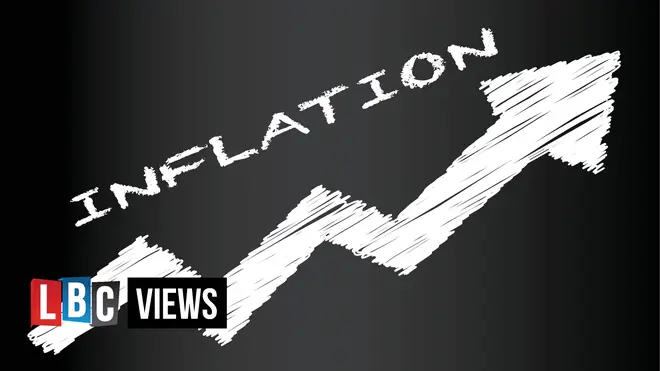
Iain Dale 7pm - 10pm
19 June 2023, 06:53

The media today, through its many facets and antennae, is more influential than at any time in living memory. Courtesy of social media nothing escapes their attention.
This is particularly true of financial journalists, who have a canny ability to leave no stone unturned in exposing financial problems, shortcomings, and some skulduggery with amazing investigative prowess. Many are also fine authors.
Here in the UK, we are constantly reminded that we are living in an environment of a serious cost of living crisis, triggering the need for food banks, as well as precipitating a gargantuan unaffordable cost of servicing mortgages and the shrinkage of disposable income.
For many the outlook looks at best foreboding and the mood of the country is dispiriting! Looking at the last 3 years here in Old Blighty, the recovery post Pandemic has been just about acceptable.
In 2020 GDP came in at -11.3%. Today, despite the ‘prophets of doom’ such as the IMF, and the BREXIT doomsters, who sentenced us into recession, the UK has kept its head above the Plimsoll line, enjoying virtually full employment (unemployment rate 3.8%), despite 8.7% inflation, but hopefully down on Wednesday’s figures.
Compare that performance to Ukraine – GDP -29.1%, inflation at 15.4% and unemployment at 24.5%!
Is life really that bad today, as say during the General Strike of 1926 or post-World War One and two?
For some, perhaps it is, as this current level of inflation and the damage it has done to household finances is all that many have known.
The thought that close to 800,000 mortgage facilities will need to be reviewed by next year and that many will see an extra £3000 added to the servicing of their existing mortgage payments is a daunting prospect, which no household will relish.
Those who had the vision and foresight to extend or renew their mortgages for lengthy periods ahead of the current interest rate mayhem may have been shrewd, but they are few in number, and very lucky.
Overall, the country will suffer. Disposable income will contract, retail sales will dissipate, and the existing buoyant labour market will contract, with unemployment likely to head north of the current 3.8% level.
Many mortgagees will need continued help, as was required during the pandemic to prevent domestic financial turmoil and a disastrous dose of negative equity.

Therefore, I thought it might be interesting to delve into the vagaries of inflation and Bank of England’s role in attempting to keep the economy ‘on the bridle’ over the past 50 years or so.
In 1972, the Country experienced the Heath Government’s ‘boom’ period orchestrated by the then Chancellor Anthony Barber. He delivered a budget which was designed to return the Conservatives to power in an election expected in 1974 or 1975.
This budget led to a brief period of growth known as "The Barber Boom", which was followed by massive wage increases and high inflation, culminating in the 1976 Sterling Crisis. Inflation briefly hit 24%! The bank rate was only 11.5% at this time!
Labour took over the reins in 1975 and Chancellor Denis Healey was obliged to seek the help of the IMF to put the Country’s finances on a sounder footing. Schroder’s Gordon Richardson was Bank of England Governor from 1973-1983.
This was clearly a challenging period all the way through to the early ‘Thatcher Years’ which started in 1979, when inflation was still at an eye-watering 13.3%, which saw the official bank rate hit 17%!
It eased back to 9.5% by 1984, just after Nigel Lawson took over from Sir Geoffrey Howe in 1983. There was still turmoil during this period. Robin Leigh Pemberton was ‘Bank’ Governor during this period with official rates hitting 14.88% in October ‘1989’, when John Major succeeded Thatcher with Norman Lamont as Chancellor.
It should not be forgotten that the UK was forced to leave the ERM in 1992, which led to another massive Sterling crisis. The abolition of exchange Controls in 1980 and ‘Big Bang’ in 1986 were further key policies, very much Thatcher initiatives. which also needed to be carefully navigated into what was still a period of financial volatility.

Kenneth Clarke’s stewardship of the economy in the latter days of the Major administration. The ‘Ken & Eddie Show’ – an open discussion between the Chancellor and the Governor was considered constructive and it was well received.
The early years of Gordon Brown and Eddie George, when the Bank of England was given independence were considered very successful. Gordon Brown worked assiduously to make sure Labour was re-elected for another term, having inherited a growing economy.
Then came the banking crisis of 2008/9, much of it due to soft regulation. Mervyn King had succeeded Eddie George. Rates fell very slowly from 5% to 0.5%. Lord King and his deputy Sir Paul Tucker saw the economy through a minefield of problems with distinction.
David Cameron’s coalition government 2010-2015 was heavily involved in austerity, much of it due to the banking crisis. There was no money to spend. Borrowing was steep. Inflation was back to acceptable levels. Mark Carney was George Osborne’s surprise choice to be governor in 2013.
By 1997 I had paid off my mortgage. My average cost of borrowing over this period was 12%. How did I manage it? House prices were much lower on a pro-rata basis.
Also housing assets for this period far outstripped the cost of borrowing. In 1972 mortgages were available at 3 times salary. Today is 5/6 times and house prices are not keeping pace with inflation.
Regardless of political hue in the future, the government must deal with the housing shortage. Enough talk – just action!
Finally, it is taken as read that the Ukraine crisis, Covid, and the supply chain have all contributed to rampant inflation, leaving the UK’s level higher than many peer countries.
Quantitative easing was essential in 2009 to put the Country back on an even financial keel. However, for £300 billion added in 2020 and a further £150 billion in 2021, making a total of £895 billion was surely a mistake.
Mark Carney’s tenure as Governor saw a few strange decisions and forecasts. Most of his ‘forward guidance’ forecasts were inaccurate and misleading.
Many felt that there was plenty of opportunity to ween the public back on commercial level of interest rates. It did not happen.
QE should have been cut to ease inflationary pressures. Mr Carney’s obsession with the damage BREXIT would inflict, was misplaced. He insisted that unemployment would be rampant, and that growth would decline substantially.
This has not been the case to date. Many have put the boot into Andrew Bailey for being tardy with rate increases to fight inflation, despite twelve consecutive base rate increases.
An additional 0.25% increase to 4.75% is expected at Thursday’s MPC meeting.
That may be the case, but I respectfully suggest that had there been a better interest rate policy over the last decade and an easing of quantitative easing, our inflationary problems may not have been so acute!